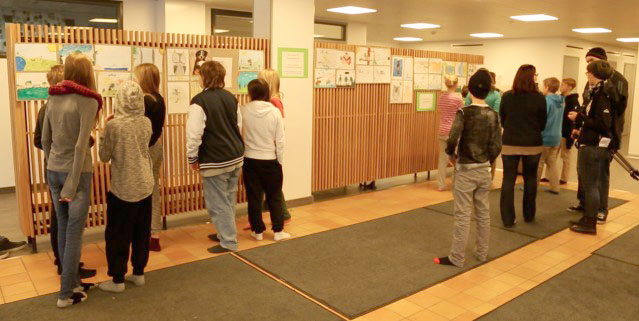Based on a successful Dutch reference index model, Sitra’s new flagging system for youth problems improves the flow of information between schools and organisations. The first Finnish city to introduce this model is Mikkeli; in the spring it will also be piloted in the Helsinki metropolitan area.
The Tajua Mut! project in Mikkeli is the first in Finland to implement a novel youth work approach and its supporting information system. New ways of collaboration between local authorities and operators are applied to prevent the social exclusion of young people. The idea behind the concept is to improve the flow of information between schools, organisations and authorities in order to tackle young people’s problems as early as possible.
The new operating model offers support to young people and allows professionals working with them to co-ordinate and improve their counselling efforts at an earlier stage than is currently possible. The first Finnish city to pilot and develop the new approach is Mikkeli, where the project is open to all aged between 13 and 29 and living in the city. Partners include local authorities and operators, outreach youth workers and Olkkari, a local counselling and service point for young people.
The approach is based on the Dutch reference index system (Verwijsindex), which has been in use since 1998. Its Finnish pilot is part of Sitra’s cluster of projects promoting youth welfare. In the Netherlands, the model was first tested in Rotterdam. Experiences were so good that a law was passed in 2010 to make this approach mandatory in all municipalities. It is now used by over 100 000 professionals in more than 400 Dutch local authority areas.
At present, even if welfare problems among young people are noticed at an early stage, all too often information is not shared between the parties involved, such as the school, leisure activity instructors and the authorities. Official information resources on young people at risk of social exclusion are scattered, being safeguarded for, say, data protection purposes by a range of professionals.
A youth worker may first become worried about a young person at the same time as sudden changes in school performance begin to worry the young person’s teacher. Unfortunately, their observations are never brought together and both professionals have to make decisions on support measures without sharing the other’s knowledge. Information on the youth worker’s concerns would provide the teacher with more grounds for raising the issue with the young person and his or her guardians. Support measures necessary for helping the young person could be initiated at a much earlier stage than current practices allow.
The first step in the new approach is a “flagging up” process, during which the young person’s name is entered into a reference index that brings professionals in touch with each other at an early stage. In the second phase, these professionals, including local authorities and the third sector, collaborate in assisting the young person. The purpose is to facilitate information exchange and communication in order to support early intervention practices. The approach has its roots in caring. Legislatively, it is based on the Finnish Youth Act and outreach youth work in particular.
In a typical example, a teacher and a youth worker become concerned about the same teenager, independently of each other. Using the common information system, they can flag up the person without having to specify reasons for the flagging. With the permission of the young person concerned (or their guardian), the teacher and youth worker are brought in touch and can begin addressing the issue together. If two professionals express their concern by entering the same name into the system, the process of offering support can be initiated in a timelier manner and problems can be tackled at an early stage.
“As a tool for outreach youth work, the approach provides essential support in the tasks at hand,” says the City of Mikkeli’s Programme Manager Juha Ropponen.
Kimmo Haahkola from Sitra explains that “the goal is to evaluate, together with our partners, how the reference index can be integrated into a holistic service concept for young people. Fundamental principles of the nationwide concept that we are creating include one-stop, low-threshold services that are available around the clock.”
Preventive work is aimed at tackling problems while they are still minor. This helps to avoid painful and costly child welfare measures, such as taking children into custody. Calculations indicate that the cost of one marginalised youth to society amounts to 750 000 euros in basic social assistance alone, not to mention loss of income and human suffering.
The pilot programme for the Helsinki metropolitan area is scheduled for later this year.
For further information, please contact:
Juha Ropponen
Programme Manager, City of Mikkeli
+358 50 345 4311
juha.ropponen@mikkeli.fi
Kimmo Haahkola
Leading Specialist, Sitra
+358 50 380 8603
kimmo.haahkola@sitra.fi
Project description on the Sitra website
Mikkeli youth service point Olkkari, Tajua Mut! project (in Finnish)
Video presentation of the Dutch approach:


